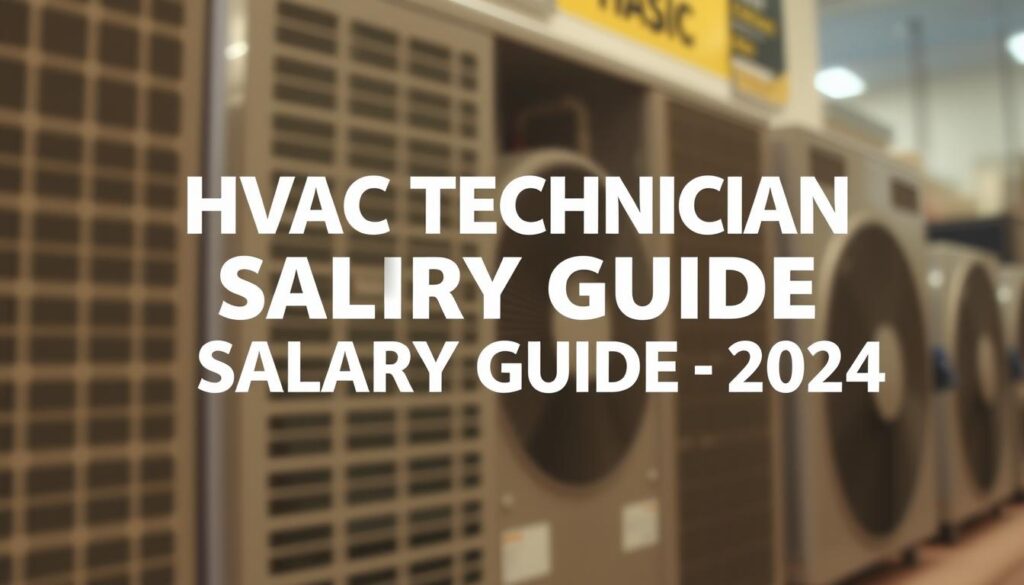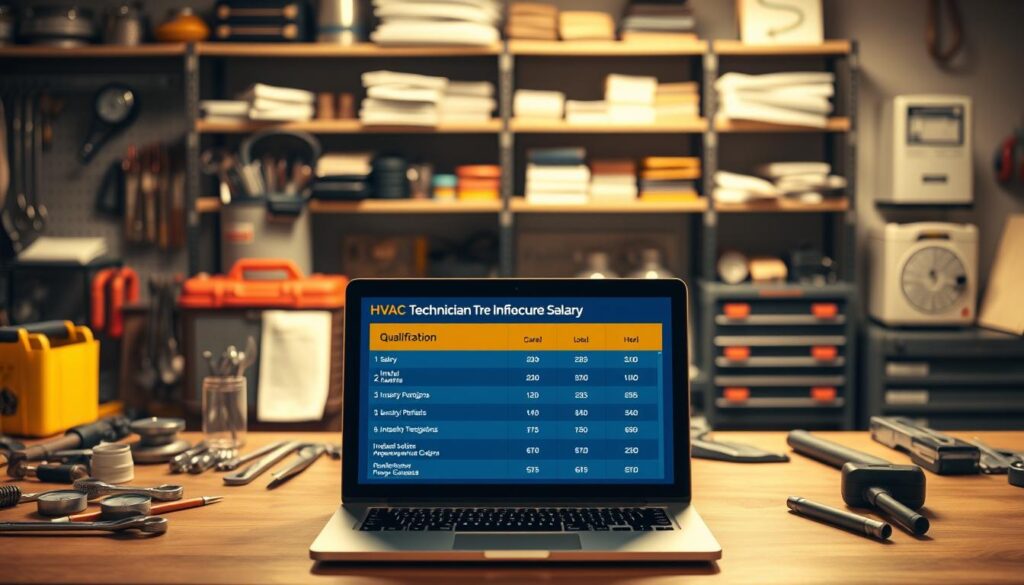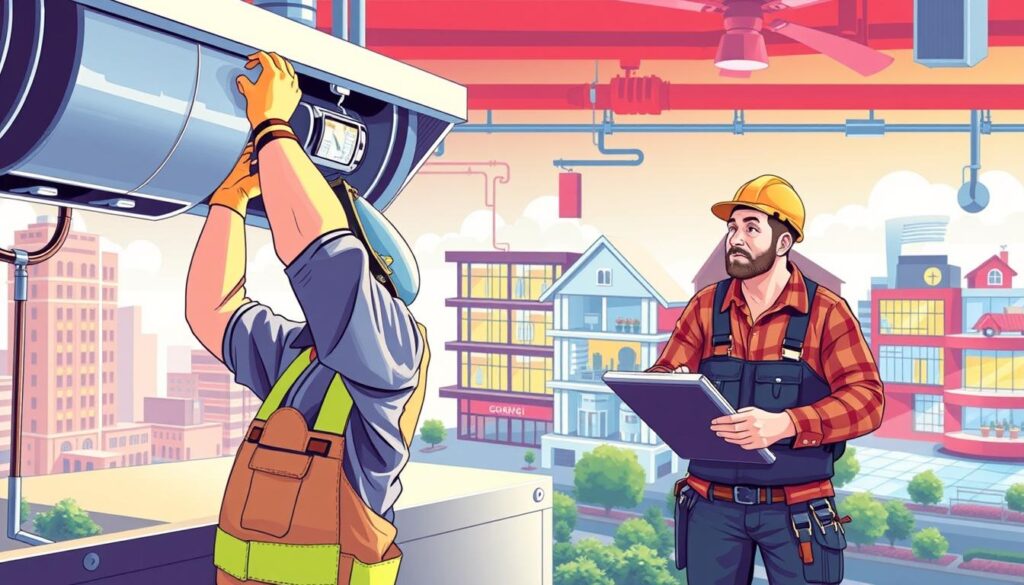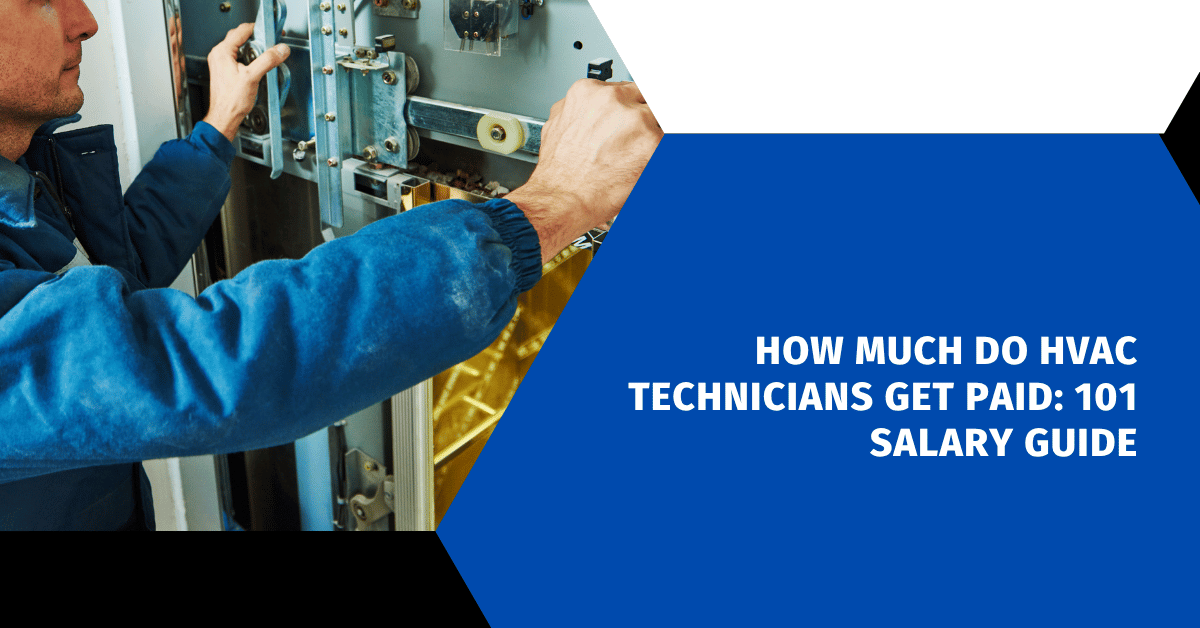Affiliate Disclosure
HVAC Guide Guys is a participant in the Amazon Services LLC Associates Program, an affiliate advertising program designed to provide a means for sites to earn advertising fees by advertising and linking to Amazon.
How Much Do HVAC Technicians Get Paid? Ever wondered how much those who fix our heating and cooling systems make? The HVAC world offers great financial rewards that might surprise you.

Knowing how much HVAC techs earn is key. The Bureau of Labor Statistics says they make about $57,300 a year on average. This makes it a great job for those looking for steady and fulfilling work.
The pay for HVAC techs is changing fast. New tech and more people needing their skills are driving this change. Your salary can go up or down based on where you work, how long you’ve been doing it, and your special skills.
Key Takeaways
- HVAC technician pay ranges widely across different states and regions
- Median annual salary is approximately $57,300 as of 2023
- Career opportunities continue to expand in the HVAC industry
- Specialized skills can dramatically increase earning
- Certification and continuous learning are key for salary growth
Table of Contents
Understanding HVAC Technician Career Prospects in 2024
The HVAC industry is changing fast, with new chances for skilled workers. As tech gets better and saving energy matters more, HVAC techs are leading the way in a changing job world.
More people are needed in HVAC, thanks to several important factors. New tech is making the industry grow, opening up new career paths and better pay.
Job Market Growth and Demand
The Bureau of Labor Statistics sees big growth for HVAC techs soon. States like Colorado, Connecticut, Maryland, New Jersey, and Texas are in high demand.
- Colorado
- Connecticut
- Maryland
- New Jersey
- Texas
“The future of HVAC is not just about fixing systems, but about understanding complex technologies and energy-efficient solutions.” – Industry Expert
Career Development Opportunities
Planning your career can really boost your earnings. You can choose from many special areas:
- Commercial HVAC systems
- Residential installation
- Energy management
- Smart home technology integration
- Green technology specialization
Industry Evolution and Technology Impact
New tech is changing HVAC. Internet of Things (IoT) and artificial intelligence offer big chances for those who keep learning.
By being open to new tech, you can succeed in this exciting field for a long time.
National Average HVAC Technician Salaries
Knowing about hvac earnings is key to planning your HVAC career. The national average hvac tech salary gives a clear view of what you might earn.
In 2024, HVAC technicians in the U.S. can look forward to good pay. Their median annual earnings show how important they are for keeping places comfy and energy-efficient.
| Salary Breakdown | Annual Earnings |
|---|---|
| National Average Salary | $49,500 |
| Average Net Salary (After Taxes) | $41,533 |
| Entry-Level Salary Range | $35,000 – $42,000 |
| Experienced Technician Salary | $55,000 – $65,000 |
Your hvac pay can change based on a few things:
- Where you live
- How long you’ve been working
- Any special certifications you have
- What kind of HVAC work you do
“The HVAC industry offers stable and rewarding career opportunities with competitive compensation,” says Michael Rodriguez, a veteran HVAC industry consultant.
By always learning and improving your skills, you can earn more. Getting special certifications and being really good at your job can lead to higher salaries.
Explore Our HVAC Shop
Looking for top-rated HVAC tools, parts, and accessories? Visit our shop and find the perfect solution for your needs.
Visit the ShopHow Much Do HVAC Technicians Get Paid Across Different States
Understanding the landscape of HVAC professional income shows big differences across the United States. Your earnings as an HVAC technician can change a lot based on where you work.
The place you work in greatly affects how much HVAC technicians get paid. Salaries vary due to local economic conditions, demand, and cost of living.
Highest Paying States for HVAC Professionals
Some states pay HVAC technicians the most:
- California: Offers top-tier salaries due to high living costs and robust construction markets
- New York: Competitive wages in metropolitan areas like NYC
- Nevada: Strong demand in commercial and residential sectors
- Massachusetts: Technical expertise commands higher pay rates
Lowest Paying States for HVAC Technicians
On the other hand, some states pay HVAC professionals less:
- Mississippi: Limited industrial development affects wages
- West Virginia: Rural economic challenges impact salaries
- Wyoming: Smaller population reduces job market opportunities
Regional Salary Variations
Your earnings can change a lot between urban and rural areas. Cities usually pay more because of higher demand and complex systems.
Pro Tip: Consider relocating to high-demand areas to maximize your earning as an HVAC technician.
Top-Paying Metropolitan Areas for HVAC Technicians
Metropolitan areas offer great chances for higher earnings for HVAC technicians. Your location greatly affects your salary. Some cities pay much more for skilled workers.
San Francisco has the highest starting salary at $64,200. New York City is close behind with an average of $60,600. These cities pay well because of their complex systems and high demand for HVAC skills.
| Metropolitan Area | Average HVAC Salary | Hourly Rate |
|---|---|---|
| San Francisco, CA | $64,200 | $30.87 |
| New York City, NY | $60,600 | $29.13 |
| Boston, MA | $58,750 | $28.25 |
| Washington D.C. | $57,400 | $27.60 |
While these cities pay well, they also have challenges. Think about:
- Higher cost of living
- Increased competition for jobs
- More complex HVAC systems
- Greater demand for specialized skills
Plan your career to balance earnings and growth. Research local markets, network, and keep improving your skills. This will help you reach your salary goals.
Experience Levels and Salary Progression
Your HVAC career is a journey of growth and increasing earnings. As you gain experience and skills, your earning power grows. Knowing how salaries increase can help you plan your career.
HVAC technicians see big salary jumps as they move up in their careers. Let’s look at how your skills lead to better pay:
Entry-Level to Senior Position Advancement
- Entry-level jobs start around $37,000 a year
- Mid-career techs make $50,000 – $65,000
- Senior techs with lots of experience can earn $84,000+
Skills Impact on Earnings
Specialized skills can really boost your value. Key skills that raise your pay include:
- Advanced refrigeration knowledge
- Energy efficiency expertise
- Smart home technology integration
- Commercial HVAC system management
Certification Benefits
“Certifications are your passport to higher earnings and professional credibility.” – HVAC Industry Expert
Certifications can greatly increase your earning power. Important certifications include EPA Section 608, NATE (North American Technician Excellence), and manufacturer-specific training.
By always learning and improving your skills, you can move up in your HVAC career. This will help you earn more.
Explore Our HVAC Shop
Looking for top-rated HVAC tools, parts, and accessories? Visit our shop and find the perfect solution for your needs.
Visit the ShopFactors Affecting HVAC Technician Compensation

Understanding hvac pay rates is complex. It involves looking at many important factors that affect an HVAC technician’s income. Your salary as an HVAC technician can change based on several key factors.
Where you work greatly affects your pay. Different places have different needs for HVAC services. For example, areas with harsh weather or fast growth often pay more.
- Location and regional market demand
- Professional experience and skill level
- Specialization within HVAC industry
- Employer type and company size
- Additional technical and soft skills
Improving your skills can greatly change your career. Technicians who get advanced certifications and training can earn more.
| Factor | Impact on Salary |
|---|---|
| Advanced Certifications | 15-25% salary increase |
| Specialized Skills | 10-20% additional compensation |
| Years of Experience | 5-10% annual increment |
Changes in the economy and new HVAC technologies also play a big role. New tech like smart homes and energy-saving systems open up chances for better pay.
Planning your career wisely means knowing these factors. It helps you aim for the highest income in the HVAC field.
Benefits and Additional Compensation
When looking at hvac technician pay, remember it’s not just about the salary. HVAC pros get a full package that boosts their earnings and job happiness.
Common benefits for HVAC techs include:
- Health insurance with medical, dental, and vision plans
- Retirement plans like 401(k) with employer matching
- Paid time off and vacation days
- Bonuses for outstanding work
Many HVAC jobs offer special perks to increase wages. These can be:
- Tool allowances to cover equipment costs
- Company vehicles or mileage pay
- Tuition help for certifications
- Training and growth chances
Extra pay for overtime can really add up, making your salary even better. During busy times, some techs can earn up to 1.5 times their regular pay.
Pro tip: Negotiate your total compensation package, not just base salary, to maximize your earning in the HVAC industry.
Explore Our HVAC Shop
Looking for top-rated HVAC tools, parts, and accessories? Visit our shop and find the perfect solution for your needs.
Visit the ShopCommercial vs. Residential HVAC Salaries
The HVAC industry offers many career paths. Each has its own income opportunities in commercial and residential sectors. Knowing the differences can help you choose the right path for your career and increase your earnings.

HVAC technicians can earn more by focusing on commercial or residential markets. Each area has its own challenges and rewards that shape your career.
Specialization Opportunities
Choosing a specialized area can greatly increase your earnings:
- Commercial HVAC systems for large buildings
- Industrial refrigeration equipment
- Advanced climate control technologies
- Green energy heating and cooling solutions
Market Demand Differences
The need for HVAC services differs between commercial and residential markets:
- Commercial sectors need complex system installations
- Residential markets focus on maintenance and replacement
- Industrial clients often pay more for contracts
Career Path Options
Your HVAC career can grow through strategic specialization:
- Start as a residential technician
- Get advanced certifications
- Move to commercial or industrial projects
- Consider starting your own business or taking on management roles
“Specialization is the key to unlocking higher earning in the HVAC industry.” – Professional HVAC Career Advisor
Understanding these market dynamics can help you succeed in the competitive HVAC field.
Conclusion
The HVAC industry offers a promising career path with good growth and financial stability. As you look into how much HVAC technicians earn, you’ll see that improving your skills can really boost your pay. The job market is looking up, with over 37,000 new jobs expected by 2024.
Your salary as an HVAC tech depends on several things. These include your training, where you work, and how much you learn. If you get advanced certifications and keep up with new tech, you can earn more. Specializing in certain areas and staying connected in your field can also help you succeed.
The future of HVAC jobs is bright. As people want more sustainable and smart homes, your skills will become even more valuable. By improving your skills, understanding local markets, and being open to change, you can build a successful and rewarding career in HVAC.
Your career path is shaped by your dedication to growing professionally. Stay curious, learn about new technologies, and keep sharpening your skills. This will help you earn more in this important and changing industry.

